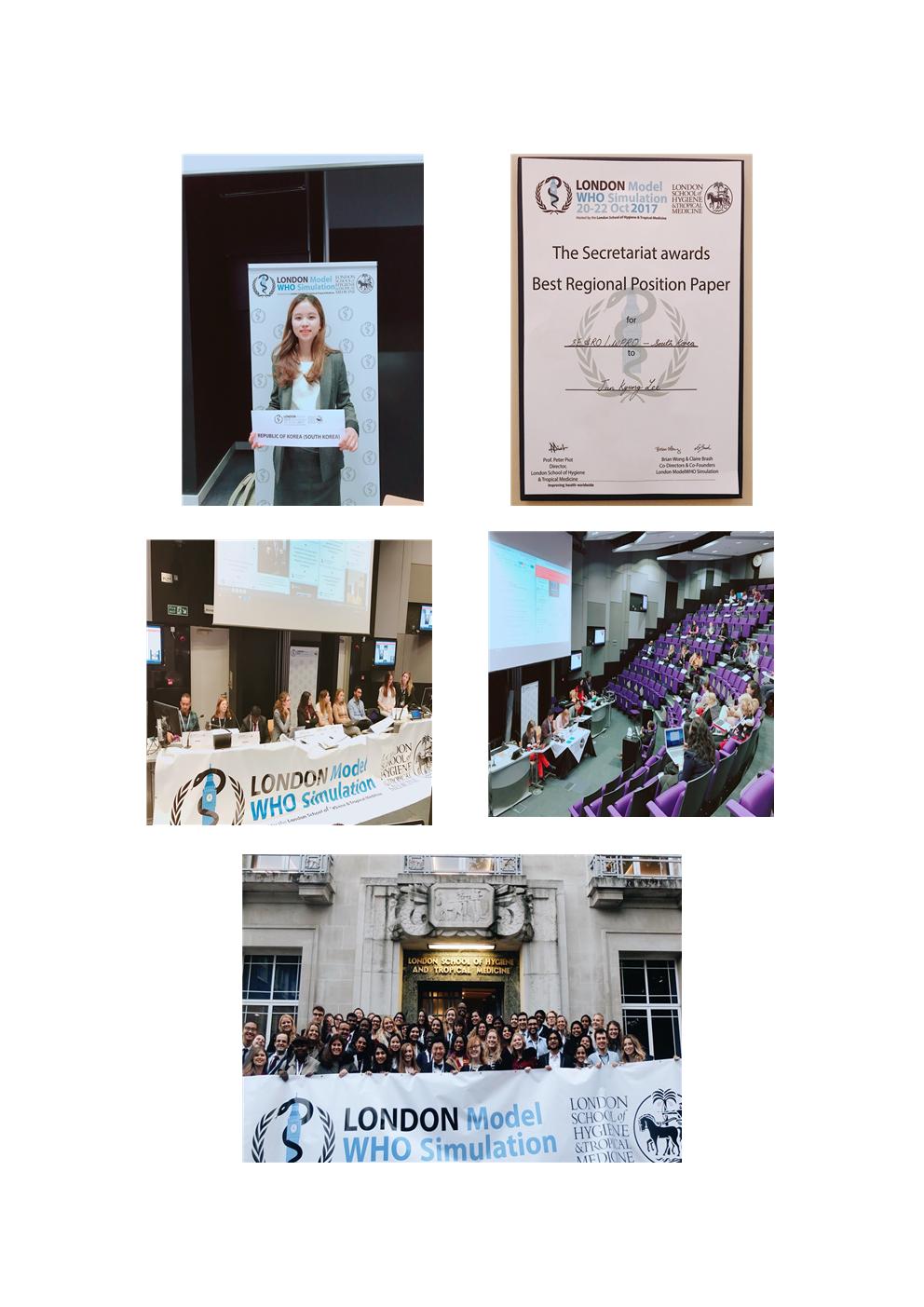학부소식
London Model WHO Simulation 참가 및 수상 후기(5학년 이준경)
- 작성자 약학대학
- 작성일 2017.10.31
- 조회 2983

London Model WHO Simulation from 20th to
22nd in October, 2017
Hosted by London School of Hygiene and
Tropical Medicine
Jun Kyung Lee, College of
Pharmacy, Inje University, Republic of Korea
I had an amazing journey to London to participate in the London
Model WHO simulation (LonWHO) from the 20th to 22nd of
October, 2017, hosted by the London School of Hygiene and Tropical Medicine (LSHTM). I found the event
notice on the LSHTM school website. Even though the physical distance from
South Korea to London is not exactly next door, only a small mind gap stood
between me and this precious opportunity. I hopped across that gap, onto my
flight, London bound!
On the first day, 54 delegates coming from different medical and
graduate schools in the UK gathered in the LSTHM. We first got training for the World Health
Assembly Simulation on Mental Health, including motions and right of reply, the
procedure for proposing plans during moderated and unmoderated caucus, the way
to state points of personal privilege/order/parliamentary inquiry, and the use
of written notes. Before participating in the simulation, each participant was
assigned one role in the simulation, representing the member states of 6 WHO
regional offices (WPRO, SEARO, AFRO, AMRO, EURO, EMRO), 3 media (BBC, Fox News, Al Jazeera), 4
NGOs (Oxfam, ICRC, MSF, Care International), 3 pharmaceutical companies
(Astrazeneca, Eli Lilly, Pfizer), UNICEF, and the Bill and Melina Gates
Foundation. For member states, there were 11 member states in WPRO/SEARO, 10
member states in AFRO, 10 member states in AMRO, and 11 member states in
EMRO/EURO. I was proud to represent my own nation, the member state of Republic
of Korea in the World Health Organization Regional
Office for the Western Pacific (WPRO).
On
the second day, WPRO and SEARO gathered together for
the regional blocks meeting. Each member state proposed action plans for mental
health during moderated and unmoderated caucus. According to the priorities of
each member state, top two actions plans were selected by voting and groups
were made. Japan, the Republic of Korea,
the Democratic People''s Republic of Korea, and the Philippines had priorities
for “dealing with high suicide rates across Asian countries”, whereas the
People''s Republic of China, Indonesia, and Malaysia supported “health workforce
strengthening for mental health”. To bring these action plans to the plenary
session on the 22nd, sponsor countries had to get support from at
least one pharmaceutical company, two votes from NGOs, UNICEF, Bill and Melina
Gates, and three signatures from other member states. Since each pharmaceutical
company could support one theme, and the NGOs and others had the rights to vote
for two themes, only six selected resolution papers could be on the plenary
session. As a delegate of the Republic of Korea, I proposed promoting the
deinstitutionalization of patients, efforts to reduce social stigma
against mental illness, the protection and monitoring of the patients'' human
and labor rights, the necessity of investment in
R&D, improving the quality, safety, supply and distribution of mental
health medicines, enhancing internet-based health (e-health) and mobile-based
health (m-health) services for mental health, advocating human rights and
voluntary hospitalization, support and analysis of the social determinants of
mental health, and empowering the voices of vulnerable people – those who live
in fragile and non-humanitarian settings. Among the many proposals made during
the regional blocks, I voted for “dealing with high suicide rates across Asian
countries”, reflecting the fact that Korea’s suicide rate has remained the
highest among OECD nations for 10 consecutive years.
On the third day, 6 resolution papers were introduced, and
amendments were made through discussions and voting by member states in the
plenary session. It was very interesting to add, edit, or delete some
resolutions. Finally, consensual amendments were made on all resolution papers
through a long
discussion. The last session on the third day was the awards ceremony.
Thankfully, I received the award of “Best Regional Position Paper” for my
research on the mental health issues in the Republic of Korea, and my proposals
on policies and action plans as a delegate of the member state of Republic of
Korea to the World Health Organization.
One
of the beauties of the LonWHO simulation was that “WE” led this simulation from
the beginning to the end, and “WE” raised our voices for public health – on
mental health in particular – through research and enthusiastic discussions and
debates. It was my privilege to discuss with the students from the LSHTM and
other medical schools in the UK. Looking back through
my life, whenever I felt that things were not going well, or felt weak about
myself, the power that made me stand up again had always been from people
surrounding me. Whenever I asked myself which point I was on the pathway to my
dream, lessons often came to my ears and heart from my dear friends, team
members, teachers, etc. Though it might take a long time to become the person
that I wanted to be, to achieve what I wanted to achieve, I believe that the
days will come. With years of experience and learning which shall form the
solid base of myself, I hope I can be more sincere and have deeper compassion
for people. I hope I can speak out not just for my interests and knowledge, but
for humanity. No matter how many reports and articles I read, and how familiar
I become with numbers and statistics, I hope that I can see the hands of the
people in need reaching through the numbers and dots on paper, and I wish to
share my own hands with them.
